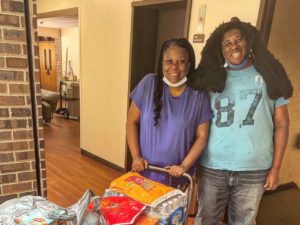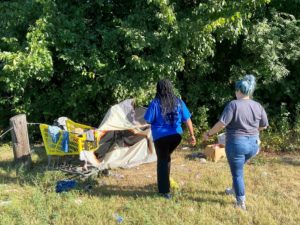 Anita Green refers to them as “neighbors.” It’s a term she uses to let those experiencing homelessness know that they’re still part of the community. “It takes a lot of the stigma away,” she explains.
Anita Green refers to them as “neighbors.” It’s a term she uses to let those experiencing homelessness know that they’re still part of the community. “It takes a lot of the stigma away,” she explains.
This attitude—one of seeing individuals on the street as members of the community—is central to her work as Outreach Manager at The Well. Her critical role in the Outreach Program, a new initiative that kicked off in June, enables The Well Community to connect with people who are experiencing homelessness. In this position, she seeks to build relationships with homeless neighbors and serve them compassionately as she offers food, referrals to local services and assistance in accessing mental health care.
The importance of helping others has been ingrained in Anita since her childhood in a small town in East Texas. She recalls her mother, a nurse, going above and beyond to assist people in need and spent a lot of time with an aunt who served as a social worker for nearly half a century. Anita brings a degree in sociology to her role at The Well and is currently earning her Master of Social Work. Her wide-ranging experience in human services gives her a uniquely valuable perspective.
Anita was drawn to this new role because it starts the process by actually going to people who need these services. “We have to start with where they are, which is on the streets.”
A day of work with the Outreach Program begins around 7 a.m. when Anita and her coworker, Outreach Coordinator Mary Benton, head out to the streets, seeking to engage their neighbors and build relationships. “We try to help them with anything we can,” she says. They might pass out snacks or water, and they always bring a willingness to listen because, as Anita explains, “A lot of times nobody listens to them. Nobody takes into account their feelings.”
Sometimes listening leads to providing assistance specific to a person’s needs. For example, Anita shares how they will soon take one neighbor to get his birth certificate so that he can obtain his ID and then be eligible for housing.
As they listen and build relationships, they may learn that a person they encounter lives with mental health issues but hasn’t been on their medication for months or even years. And, when one of these neighbors shows up at The Well Community for lunch, they’re able to point out a mental health facility just a block away and offer to walk over with him or her to help fill out paperwork and make a first appointment.
Little by little, listening enables the staff of the Outreach Program to move toward their goal of linking people to mental health services. “That’s a slow process,” Anita says, sharing that some homeless neighbors need these services, but don’t recognize their mental health needs or aren’t ready to accept assistance. So, she seeks to meet them where they are and help them work toward what they want to accomplish.
As she interacts with neighbors experiencing homelessness, Anita seeks to be sure that they have the dignity of making choices for themselves. “We don’t want anybody making decisions for us, so I try to be very mindful and take that same approach when I’m working with our neighbors.” She recognizes that literacy is often a barrier and knows from her previous work experience that many people on the street are embarrassed that they cannot read. So, her conversations with these neighbors can help them gain the knowledge they need to make their own choices.
 Anita is also mindful of the fact that members of the homeless population are often taken advantage of, and as a result, they may be reluctant to give out any personal information. She typically waits until the second or third time she meets a person to ask if they’d like to tell her their name and seeks to build rapport over time.
Anita is also mindful of the fact that members of the homeless population are often taken advantage of, and as a result, they may be reluctant to give out any personal information. She typically waits until the second or third time she meets a person to ask if they’d like to tell her their name and seeks to build rapport over time.
Part of establishing trust involves following through on what she promises to do—for example, showing up at an agreed-upon time to help a neighbor with a food stamp application. “They’ve been let down a lot,” she shares. “I try to be something consistent in their lives because they don’t have a lot of consistency.”
Amid the challenges of her role, Anita takes joy in seeing those she works with accomplish the things they’d like to achieve. “Sometimes they just want to get their ID because they haven’t had an ID in 10 years, and they want to have one in their hand. If I can help them get that and it makes them happy, then I’m happy.”
She lights up when she shares a story of a man she and her coworker met at a train station—a man who claimed they couldn’t help him. The two women asked him about his situation and learned that he’d come from Michigan in hopes of building a new life for himself; while he had a housing voucher, he hadn’t been able to get in touch with anyone about it, and the voucher was about to expire.
Anita offered to look at his paperwork, and after reading it, got in touch with the housing authority to advocate for him. As she shares with a smile, “By the time we got back to the office, someone had called him. He got a new voucher.”
Through the work of The Well’s Outreach Team, this man was given all he needed to be able to get an apartment in Dallas. “That’s a success story for me,” Anita says. She recalls the man’s response: “You guys just stepped right in. I have been trying for over a month just to get somebody to talk to me. You guys just knew exactly what to do and how to do it.”
When asked what she wishes more people understood about homelessness and mental illness, Anita shares about a huge factor that often underscores homelessness: “There’s so much underlying trauma that leads to substance abuse or to a mental health disorder.” Anita emphasizes, “You just never know a person’s situation. … There’s so much underlying trauma walking around with those who are living on the streets.” She adds, “I think, ‘This could be a family member of mine. How would I want them to be treated if they were?’”
Much of the answer to that question boils down to the way in which Anita sees the homeless people she encounters: “They’re still our neighbors no matter if people want to walk over them or walk by them or turn a blind eye to them. They’re still part of our community.”
The Well Community is there for them, offering a community that restores dignity and fosters mental health stability. Your support makes such an environment possible. Give today.
